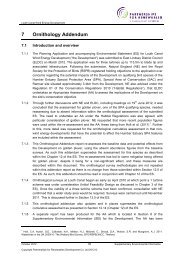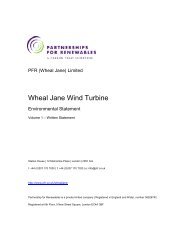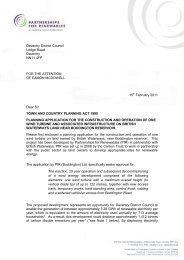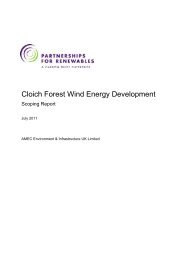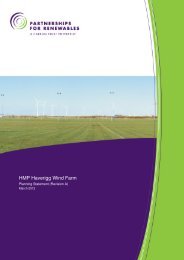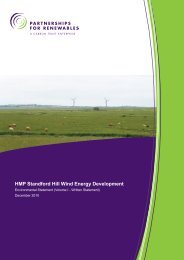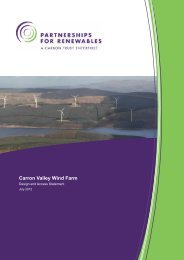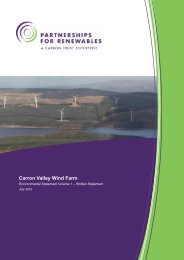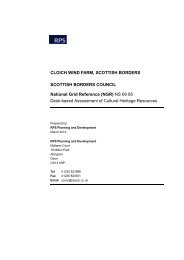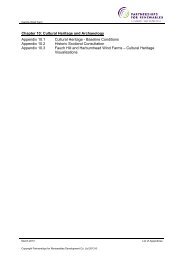Planning Supporting Statement - Partnerships for Renewables
Planning Supporting Statement - Partnerships for Renewables
Planning Supporting Statement - Partnerships for Renewables
You also want an ePaper? Increase the reach of your titles
YUMPU automatically turns print PDFs into web optimized ePapers that Google loves.
Louth Canal Wind Energy Development<br />
4.4.3 Where suppliers do not have sufficient ROCs to meet their obligations, they must pay an<br />
equivalent amount into a fund, the proceeds of which are paid back on a pro-rated basis to<br />
those suppliers that have presented ROCs. The obligation in England and Wales <strong>for</strong> 2011/12 is<br />
0.124 ROCs per MWh i.e. approximately 12% renewable electricity. From 1st April 2012 till the<br />
31st March 2013 the obligation in England and Wales will be 0.124 ROCs per MWh. The<br />
ROCs per MWh is set to rise year on year. Alongside the Energy Act the Government has<br />
introduced further legislation including the Climate Change Act 2008 and the <strong>Planning</strong> and<br />
Energy Act 2008, which are intended to work collectively to enable the long term delivery of the<br />
UK‟s energy and climate change strategy.<br />
4.4.4 The Climate Change Act creates a new approach to managing and responding to climate<br />
change by setting ambitious, legally binding targets of at least 80% cut in greenhouse gas<br />
emissions by 2050, with specific reduction in CO2 emissions of at least 26% by 2020 against a<br />
1990 baseline. The <strong>Planning</strong> and Energy Act enables local planning authorities to set their<br />
own energy use and energy efficiency requirements in their local plan policies. It is clear that<br />
one of the Government‟s key objectives, through the various 2008 Acts, is to maximise and<br />
speed up the delivery of renewable energy provision and to reduce greenhouse gas emissions.<br />
4.5 The UK National Renewable Energy Action Plan<br />
4.5.1 Under Article 4 of the European Renewable Energy Directive (2009/28/EC) the UK was<br />
required to submit a National Renewable Energy Action Plan, 2010 (NREAP). The NREAP<br />
sets out the trajectory and associated measures that will enable the UK to reach its target <strong>for</strong><br />
15% of energy consumption in 2020 to be from renewable sources. The „lead scenario‟ within<br />
this document indicates how the UK can meet this target and provides a view of the technology<br />
mix in 2020. However, this scenario does not represent a target <strong>for</strong> any particular sector or<br />
technology and it should not be seen as an upper limit to the UK‟s ambition <strong>for</strong> renewables<br />
deployment. The Action Plan highlights that:<br />
“The UK needs to radically increase its use of renewable energy.” 7<br />
4.6 The UK Low Carbon Transition Plan and Renewable Energy Strategy<br />
4.6.1 The Government published the UK Low Carbon Transition Plan and Renewable Energy<br />
Strategy in July 2009. A central element of the UK Low Carbon Transition Plan is the aspiration<br />
to generate approximately 30% of all energy through a renewable source by 2020,<br />
representing a five-fold increase on current production levels. The Renewable Energy Strategy<br />
was published in tandem with the Plan to explain how this will be achieved. Specifically, it<br />
explores how the country will meet its legally-binding target to ensure that 15% of its energy is<br />
produced from renewable sources by 2020.<br />
4.6.2 The Strategy‟s lead scenario suggests that over 30% of electricity could be generated from<br />
renewables by 2020 (compared to 2.25% in 2008), of which approximately two-thirds are likely<br />
to be provided by wind turbines. Box 12 of the Renewable Energy Strategy advises that “wind<br />
power is currently one of the most developed and cost effective renewable electricity<br />
technologies. The UK has the largest potential wind resource in Europe.”<br />
7 DECC, National Renewable Energy Action Plan, 2010<br />
March 2012 9 <strong>Planning</strong> <strong>Supporting</strong> <strong>Statement</strong><br />
Copyright <strong>Partnerships</strong> <strong>for</strong> <strong>Renewables</strong> Development Co. Ltd 2012 ©



